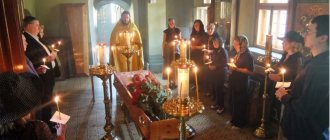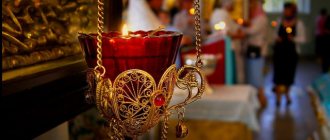Suicide, refusal of the great gift of God - life, has always been considered a great sin in the Orthodox Church. Therefore, it is not surprising that people who independently, of their own free will, took their own lives are not buried, and no memorial services are ordered for them in churches and monasteries. There are no special days that are an exception to this strict rule. Those who committed suicide are commemorated only privately. Only at home, with the blessing of the priest, can you pray for their souls. In memory of them, you can organize a wake at home and perform various good deeds, for example, give alms. At the same time, it is important that the life of the relatives and friends of the deceased themselves be pious. In addition, there are special prayers to support the grieving relatives of a suicide victim.
The attitude of Orthodox Christians towards suicide
Voluntary taking of one's life is perceived by Christians as resistance to God's will, a rejection of faith in Him and salvation. After all, no one has the right to interrupt the path measured out by the Lord for each person. Anyone who kills himself is deprived of the right to inherit the Kingdom of Heaven and renounces salvation. A soul that leaves the body at the moment of committing a sin cannot find peace and tranquility. She's going to hell. Every person in his life receives trials from the Almighty. He also receives support from God in order to pass them with dignity. And only the Lord is free to decide issues of life and death.
Whom does Orthodoxy classify as suicide?
Orthodox Christians consider suicides to be anyone who has taken their own life, regardless of how it was done. In former times, those who died in duels were also classified as suicidal. Now they include those who used euthanasia, died during a robbery, or lost their lives while engaging in extreme sports. The greatest sin is death due to drugs and drunkenness. After all, even if suicide could be committed in a state of unconsciousness, a person chose these harmful, sinful addictions for himself in his right mind and of his own free will.
The fact of the suicide of the deceased should under no circumstances be hidden from the priest or attempt to conduct the burial according to the traditional rite. Violation of church rules and prohibitions regarding those who have committed suicide can bring severe punishment for sin on people who hid the fact of suicide, and on the priest who unwittingly violated the sacred canons. After all, God sees everything and it is impossible to deceive him.
Exceptions to church rules
Each case of suicide is individual, therefore the church’s decision on it may be different. The exception to the rule is often the mentally ill who took their own lives under the influence of their illness, not realizing what they were doing at that moment. Memorial services can also be held for a person who committed suicide under the pressure of difficult circumstances. In Christian chronicles one can find references to holy martyrs who committed the act of death in order to prevent the violent desecration of their bodies. Mitigation is possible for those who committed suicide through negligence and managed to repent of it before their death.
To make a decision in such cases, documentary evidence of the illness leading to suicide is collected. For example, medical certificates of serious mental illness. They need to be addressed to the diocesan administration of the city, to the ruling diocesan bishop. You should not try to forge such documents in an attempt to mislead church authorities. The Almighty cannot be deceived. Such deception will only further harm the soul of the suicide victim and plunge into sin the souls of people trying to deceive God and the church.
When can we commemorate suicides?
On Ecumenical Parental Saturday, you can remember those who committed suicide, since the service is held for all the dead. However, names are not mentioned.
On Radonitsa, you can also commemorate the voluntarily dead, since their soul is receptive to prayer due to the thinning of the border between the world of the living and the world of the dead (as on Halloween among Western Christians). On this day, lost souls approach their home and relatives.
You can hold a memorial at home in the form of a conversation with the Lord, light candles near icons, and also give alms on behalf of the deceased. A special service can be ordered in the church, gathering with relatives. If you do all this for a deceased loved one, there is a chance that God will have mercy on his soul and give him peace. In the meantime, he wanders between Hell and Heaven, undergoing trials.
Traditions of funerals of suicides
In order not to fall into sin and not to lead the priest into it, it is necessary to tell him all the circumstances of the death of the deceased. Father will help and tell you what to do in a particular case. Those who commit suicide are not buried on the consecrated ground of church cemeteries. However, in the modern world, everyone is buried in public (not church) cemeteries.
The burial should take place on the 3rd day after death. In this case, no funeral service is held. A church veil and aureole are not placed on the body. After all, by the very fact of suicide, this man abandoned God and salvation. You cannot order a magpie or a memorial service for him. You cannot invite a priest to your home to conduct memorial services for a person who has committed suicide. A cross is not placed on the grave of a suicide. Relatives often try to reach a compromise by placing a cross on the tombstone. But it is important to remember that a cross painted on a tombstone will not help a person who voluntarily gave up life. He can only be helped by prayer and good deeds.
Commemoration of suicides in Orthodoxy
On memorial days, relatives of the suicide victim can take part in a consoling prayer held in the church. To conduct it, you need to ask a priest. This prayer is not a funeral service. This is in no way a commemoration of the deceased or a service for his soul. This is a prayer service in support of his grieving relatives. There is a misconception that on some special days of the year the church allows people to remember those who have committed suicide, for example on Radonitsa or on Parents' Saturday. This opinion arises from the fact that these days they commemorate “those bitten by snakes,” “those who fell from a height,” “absorbed by waves,” “strangled,” etc. But there are no suicides on this list; all these cases refer to those who died through no fault of their own. You can remember those who committed suicide and pray for them only at home. In church you cannot light candles for them, write or give notes, or order any other services.
How to remember those who committed suicide at home
The church allows you to assemble a memorial table and remember the deceased with a kind word on the day of his death, on the day of the funeral and on other memorial days. You can make a wake for 9, 40 days. It is allowed to give alms for him. It is important to remember that praying for a suicide at a funeral meal can only be done with the blessing of a priest and only by baptized people leading a pious life. To do this, you can use a special prayer rite or turn to God in your own words.
Radonitsa or how to help a suicide
If we continue this topic seriously, then it is up to everyone to personally decide what to do with such a deceased person whom the church has abandoned. It is often advised to simply forget about them. Previously, such dead people were buried outside the village cemetery, in especially remote places. If the cemetery was located closer, then such people were buried, on the contrary, further away.
Where the souls of suicides end up after death, to put it mildly, they are not entirely happy. The energy shell of the suicide, which remains with the body near the grave, also suffers greatly.
The energy shell is located near the grave of the suicide, and his soul can visit the grave, the place of life and death, only on this one day of the year - on Radonitsa. If this soul is not allowed to leave the places of its posthumous stay at all (for special offenses), then it can only hear the words, questions, prayers addressed to it on Radonitsa and be able to answer the questioner. Only one day a year, on Radonitsa! This is explained by the special energy of this day and the fact that the line between the “lower” parts of Navi and Yavi on Radonitsa is especially thin.
Go to church on Radonitsa, pray for this soul, light a candle for the repose of this soul. You can take the prosphora and try to give communion to such a soul, leaving it on the grave. The so-called evil souls do not remember at home, especially on Radonitsa! For example, if the deceased committed suicide at home (in your house or apartment where you live), then you should not leave food for him (bread, honey, etc.) in the same house. You should not “feed” him in the house; this is a special place for such a soul - the place of his death.
Prayer of the Optina elders for suicides and other prayers for them
This is one of the most famous prayers that can be prayed for hanged people, drowned people or other suicides. The Optina elders allowed to remember suicides in home (cell) prayer and to give alms for them. According to many examples, a short prayer conveyed by the Optina elder Leonid (in schema - Leo) to the relatives of those who committed suicide brought them peace and consolation, and turned out to be very effective before the Almighty. Of course, such prayers must be offered with great faith and hope.
Prayer for suicides achieves two important goals. For the deceased, this is an opportunity to beg the Lord for forgiveness and peace. The Church knows such examples. For his living relatives, such prayers bring comfort and peace to the soul and family.
In addition to this prayer rule, you can also remember suicides with the “Prayer of a parent for a suicidal child”, “Prayer of children for suicidal parents”, etc. Any of them can be read every day with a lit candle, but only with the blessing of the priest. After all, even private prayer for suicides may turn out to be unsafe for those who offer it. There are many known cases when relatives who prayed without blessing suffered from attacks from demons, became drug addicts, drunkards, gambling addicts, and began to strive for suicide themselves. Therefore, the priest does not give blessings to people who are spiritually weak to read such prayers. If a blessing for prayers for a suicide was not given, you can do alms and other good deeds in the name of the deceased. For example, selflessly helping those in need.
The prayer of relatives for a person who has committed suicide is extremely important. With its help, with the necessary perseverance and humility, having betrayed the fate of the sinner to the immeasurable mercy of God, you can beg his forgiveness from the Lord. After all, he is merciful and generous. If a blessing has not been given to read such prayers, relatives and friends can only help the restless soul of a suicide by their own pious life and good deeds done in the name of the deceased.
Orthodox Life
Priest Andrei Chizhenko answers.
No. Always before Trinity Day, which is celebrated on Sunday, Trinity Parents' Memorial Saturday is celebrated. On this day we pray in churches during the morning service, during the funeral Liturgy, memorial services for the repose of the souls of all Orthodox Christians who have since passed away forever. We submit notes and make offerings of mercy for our deceased, baptized in Orthodoxy, relatives.
Unfortunately, there is a belief in society that it is on Trinity Parental Memorial Saturday that once a year you can submit notes for a memorial service or Liturgy about suicides. It contradicts canonical church rules.
At the end of the 4th century there lived St. Archbishop Timothy of Alexandria. At one time, in 381, this saint was a participant in the Second Ecumenical Council. Thanks to his learning and godly life, many bishops turned to him to resolve various perplexing issues. 18 of his answers to questions about communion and moral purity by the 2nd rule of the VI Ecumenical Council acquired canonical force.
According to the 14th rule of St. Timothy of Alexandria, there cannot be an offering in the Church for suicides.
This is what the rule sounds like...
"Question. If someone, being beside himself, raises his hands against himself, or throws himself down from a height: should there be an offering for such an existence, or not?
Answer. About such a clergyman must judge whether, being out of his mind, he truly did this. For often those close to someone who has suffered from himself, wanting to achieve that there will be an offering and prayer for him, lie untruthfully and say that he was beside himself. It may be that he did this out of human resentment, or on some other occasion out of cowardice: and an offering for such a thing is not appropriate for existence, for he is a suicide. Therefore, the clergyman must certainly test with all care, so that he does not fall under condemnation.”
Why doesn’t the Church pray for suicides? Let's try to understand the tragic phenomenon of suicide...
Of course, this is a terrible tragedy and spiritual catastrophe for a person who committed suicide. And a huge pain, a serious wound for his relatives and loved ones.
But in fact, suicide is a rebellion against God. It does not happen suddenly, not unexpectedly. The idea of suicide matures in a person for a long time. The Holy Fathers recognized the following stages of suicidal passion (in increasing order): despondency - despair - suicide.
An elderly woman, beautiful in her youth and lost her attractiveness in old age, who does not want to live and die slowly. A teenager who fell deeply and passionately in love and was rejected by the object of his adoration. An alcoholic or drug addict who is in the stage of a severe alcohol or drug hangover. A businessman who is entangled in loans and debts, a cancer patient who does not want to suffer, etc. What do these cases have in common?
A person wants something strongly and passionately. The Lord does not send this to him, because it is not useful for him. He gives a person the correct and necessary life for his salvation. But he, intoxicated by his passion, pride, unwillingness to humble himself, rejects the life offered by God, and seems to say to himself: “You didn’t give me what I want, and I won’t accept what you give me.” Despondency sets in. A person begins to feel sorry for himself and, as a rule, enjoy this self-pity, his shame, his fall. He drowns in the sweet waves of depression mixed with selfishness. He is not interested in the world, other people. He admires his own pain. Gradually, in this sweet bliss of despondency, a moment comes when the line between “bad and good”, between good and evil, morality and etiquette in human behavior is erased, and, finally, such a person falls into the black abyss of despair, when the world seems to be gone for him does not exist. Living in it, he is spiritually and heartily, figuratively speaking, a thousand kilometers away from it. The last line is erased: the instinct of self-preservation disappears. And now life was cut short.
Man voluntarily loses or rejects God, and without Him the world is just emptiness - an abyss of icy cold space.
Of course, we shouldn't tar everyone with the same brush. Each suicide case, like each person, is unique. But the fact remains a fact. A person voluntarily renounces God and His Church. This is the essence of suicide.
That is why the Church does not pray for suicides. The man himself refused Her saving help of his own free will. For him, repentance is no longer possible. He himself abandoned heaven, so do we - priests and relatives - have the right to force him there? As they say, you can’t force yourself to be nice.
But, of course, there is another category of suicides. These are those who took their own lives under the influence of severe or chronic mental illness. For example, a schizophrenic who suffers from hallucinations and cannot understand where reality is and where his fantasy is. Mental illness or mental impairment is a mitigating circumstance. Saint Timothy of Alexandria also writes about this in the 14th canon. Therefore, if a person who committed suicide was registered in a psychiatric hospital, then the relatives of the deceased can take a certificate from the appropriate doctor about mental illness and apply with it to the Ruling Bishop, who can allow the funeral service for the deceased in absentia. The earth is taken from the grave of the deceased, and the priest performs the rite of Orthodox burial over it, as over a body. But still, even such a suicide cannot be commemorated in the temple.
What should relatives do?
First of all, pray for a suicide privately, that is, at home. Church prayer for a person who has committed suicide is prohibited, but private prayer is possible.
This is how, for example, the Optina elders taught.
The Monk Leonid (in schema Leo) instructed his disciple Pavel Tambovtsev, whose father committed suicide: “Commit both yourself and the fate of your parent to the will of the Lord, the all-wise, all-powerful. Don’t experience the Most High’s miracles. Striving with humility to strengthen yourself within the limits of moderate sadness. Pray to the All-Good Creator, thereby fulfilling the duty of love and filial duties.
- But how to pray for such? - asked the novice.
- According to the spirit of the virtuous and wise, like this: “Seek, O Lord, the lost soul of my father, if it is possible, have mercy!” Your destinies are unsearchable. Do not make this my prayer a sin, but Thy holy will be done!ˮ.
- Pray simply, without testing, committing your heart to the right hand of the Most High. Of course, it was not the will of God for such a sad death of your parent, but now it is completely in the will of the Mighty One to cast both soul and body into the fiery furnace, who both humbles and exalts, dies and gives life, brings down to hell and exalts. Moreover, He is so merciful, omnipotent and loving that the good qualities of all earthly beings are nothing before His highest goodness. For this reason, you should not be overly sad. You will say: “I love my parent, which is why I grieve inconsolably.” Fair. But God, without comparison, more than you, loved and loves him. This means that you can only leave the eternal fate of your parent to the goodness and mercy of God, who, if He deigns to have mercy, then who can resist Him?
The Monk Ambrose of Optina thought the same way. He instructed one nun:
“You also write about the unfortunate death of the brother of one of your novices and ask if it is possible to remember him. According to church rules, one should not remember him in church, but his sister and relatives can privately pray for him, as Elder Leonid allowed Pavel Tambovtsev to pray for his parent. Write out this prayer... and give it to the family of the unfortunate person. We know many examples that the prayer conveyed by Elder Leonid calmed and consoled many, and turned out to be valid before the Lord.”
That is, relatives and friends can take upon themselves the responsibility after the death (meaning suicide) of a relative to read about him privately for forty days (or maybe longer, constantly) the prayer of St. Leo of Optina:
“Seek, O Lord, the lost soul of Thy servant or maidservant (name), if possible, have mercy! Your destinies are unsearchable. Do not make this my prayer a sin, but Thy holy will be done!”
There is also a Canon about those who died without permission, written by Metropolitan Veniamin (Fedchenkov). It is also read privately. You can download it on the Internet or buy it at some church store. To read all these prayers, you need to take a blessing from your confessor, or, failing that, from a priest.
You can and should do deeds of mercy for a suicide: donations to the poor, the homeless, etc. Just don’t ask people to remember the deceased suicide.
Also, the Holy Synod of the Russian Orthodox Church, by its decision of July 27, 2011, established a special Rite of prayerful consolation for the relatives of those who died without permission.
This was done because, as it is written in the Resolution of the Synod: “at present, most of those who committed suicide are people who were baptized, but who did not receive either church education or church care. They end their lives not as a result of conscious opposition to God and the Church, but because they are “out of mind,” although this is not recorded by medical evidence. It is impossible for a priest who did not know the deceased in his life to decide how to relate to such a death, and relatives and friends of suicides, meeting the priest’s refusal to perform a funeral service, move even further away from the Church, without receiving consolation.”
This is not a funeral service for a suicide, but a prayer service that is served in a church for the relatives of a person who has committed suicide, so that they can receive consolation. The rank can be served not once, but many times as necessary.
The above-mentioned Resolution of the Synod of the Russian Orthodox Church also states that “Church canons prohibit “offering and prayer” for suicides (Timothy 14), as those who have consciously alienated themselves from communion with God. The validity of this rule is confirmed by the spiritual experience of ascetics who, daring to pray for suicides, experienced irresistible heaviness and demonic temptations.”
Therefore, dear brothers and sisters, let us be within the saving fence of church obedience. It is our road to the Kingdom of Heaven. There are ways of praying for suicides and consoling relatives, blessed by the experience of holy ascetics and the Church itself. Let us bow our necks to them and surrender everything to the will of God. Do not give yourself, your soul and heart over to excessive grief, but most of all leave your grief to the Almighty.
He will heal and heal the wounded heart and sick soul.
Priest Andrey Chizhenko










